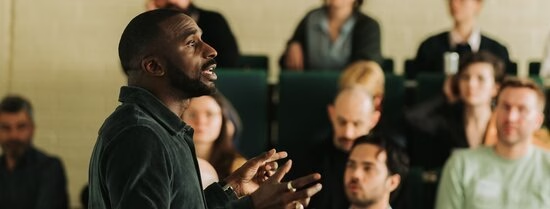Last week, QuEUR (the queer employees’ network of Erasmus University Rotterdam) organized its first Pride in Progress Symposium on “Celebrating Diversity in Queer Discourses” with students, alumni, academic staff, and professional services from all faculties and institutions of our university. What a blast we had, in a full house!
The key lecture by dr. Joel A. Davis Brown focused on queer wisdom and how to use it for inclusive leaderships: “LGBTQ+ people inhabit almost every corner of the globe. Yet, despite their presence and increasing visibility in our intercultural world, there is a perceptible void when it comes to understanding and engaging LGBTQ+ culture. LGBTQ+ people possess a cultural genius that can transform our planet. If we as leaders, interculturalists, practitioners, and global citizens want to tap into the LGBTQ-inspired “well” of wisdom, then we have to unlearn what we have learned in order to receive, explore, and honour the stories of LGBTQ people. The gifts that the LGBTQ+ community hold reside in all of us.”
The symposium was followed by four parallel sessions where 13 researchers presented their research on queer related topics. Our policy adviser, and board member of QuEUR, Paulo Carvalho da Silva, moderated the third parallel session on “Queer youth, migrants and students”. Paulo: “During these three presentations we understood the necessity of “social bubbles” for the wellbeing of queer staff and students in higher education institutions, we went through the contextualization of queer African migration in Sub-Saharan African politics and we discovered new projects, targeted at policy officers, on how to fight stigmatization, loneliness, and mental distress on queer refugees and youth in the Hague and the region of South Holland.”
You can find more about the researchers and their topics below.
Psychological and Sociocultural dynamics
- Clement Bellet (ESE) - Do Customers Respond to Social Movements? Evidence from Gender-Stereotypical Purchases After #MeToo
- Ruth van der Hallen (ESSB) - Secrecy dynamics within the LGBTQIA+ community compared to cisgender heterosexuals
- Jaïr van Nes (ESSB) - How sex/gender is enacted within contemporary neuroscience studying trans and gender non-conforming (TGNC) people and the implications thereof for their bodily integrity and subjectivity
Media, Online Representaion, and Information Sharing
- Bartosz Zerebecki (ESHCC) - Media representation of diverse characters with an analytical focus on People of Colour and non-heterosexual characters in Sex Education and their effects
- Marit Dukker (ESSB) - The impact of negative reporting on the wellbeing and coping strategies of LGBTQ+ people in the Netherlands
- Yana Zaharieva (ESHCC) - Queering Commons: An Exploratory Look into the Information Commons in LGBTQ+ communities
Queer youth, migrants, and students
- Elissaios Papyrakis (ISS) - Understanding the life experiences of LGBTQ youth and refugees in The Hague
- Minyuan Cheng (ESE) - Sense of Belonging and Social Bubble of LGBTQIA+ Students in Universities and EUR
- Jamel Buhari (Institute for History - Leiden University) - Queer Sub-Saharan African migrants in the Netherlands: the intersections of sexuality, race, gender, class and religion
LGBTQIA+ rights, hate speech and self-expression
- Tim van der Toorn (ESSB) - From Persecution to Pride? The Impact of War on LGBTQ+ rights. A Case Study on Russia and Ukraine.
- Efrance Nabaloga (ISS) - The role of social media on the self-expression of LGBTIQ community in Uganda
- Tegan Snyman (ESL) - Religiously motivated 'hate speech' targeting queer people: an international human rights law analysis

